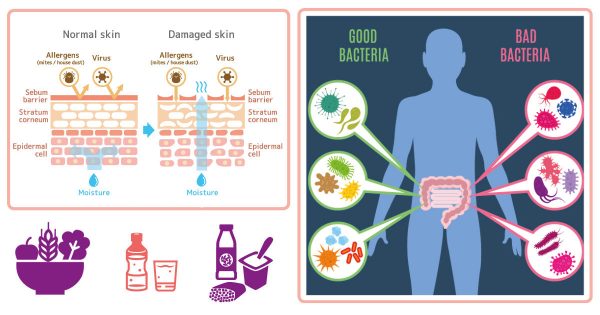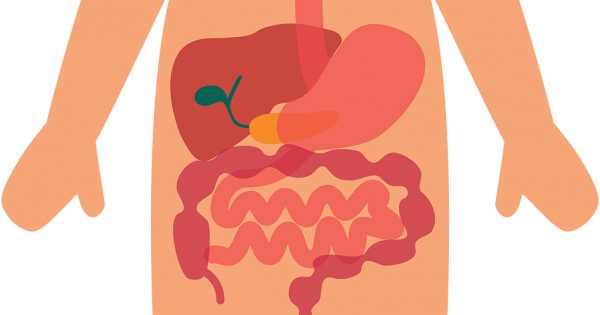Probiotics are the live microorganisms that live in your body, which provide you with many positive benefits to your health. Although bacteria can, and often do, cause diseases, probiotics are the ‘good’ bacteria that help keep your gut healthy. They are most prevalent in your gut, thus form the bulk of your gut microbiome.
Several studies have also shown various other benefits associated with probiotics, which have potentially been shown to help with allergies (e.g. skin conditions such as eczema or food allergies caused by lactose intolerance), preventing urinary tract infections, may prevent common colds and even influenza (as probiotics will boost your overall immunity), and even oral health (e.g. beneficial effects were observed on people with root caries).
Balancing Probiotics and Prebiotics
Maintaining a proper balance between the good and the bad bacteria of your gut microbiome is important, and the way to achieve it is by ensuring that your ratio of beneficial-to-bad bacteria in your gut is kept in equilibrium. Avoiding the imbalance between the good and the bad bacteria so called ‘dysbiosis’ is important to prevent disease. There are two basic things you will need to address in order to achieve this. Firstly, ensure that you eat sufficient probiotics on a regular basis and lastly, ensure that you eat sufficient prebiotics daily. Combination of prebiotics and probiotics will lead to symbiotics that can potentially synergize the positive effects to our body.
Probiotic-rich foods typically come from fermented foods such as fermented milk products (e.g. cheese, yoghurt, cultured milk drinks), fermented soy products (e.g. tempeh, bean curd, miso, natto), and fermented vegetables (e.g. kimchi, sauerkraut, acar, Chinese hum choy).
Prebiotics are ‘food’ for the bacteria in your digestive system. Think of them as ‘food’ for the ‘good’ bacteria – just like you, they need to be nourished in order to flourish. Prebiotics can be found in high-fibre foods such as onions, garlic, banana, shallots, leeks, asparagus, and whole grains. While not all high-fibre foods are prebiotics, do not neglect them as they help bulk up your stool and promote regular bowel movement.
The many forms of probiotics
One of the most common forms of probiotics come from the Lactobacillus family which can be easily obtained from yoghurt and other fermented foods. They have been documented to help with both preventing and curing diarrhoea and, there is also evidence that it helps people who are not able to digest lactose.
Another common probiotic family is Bifidobacterium, which can also be found in several dairy products. Studies have shown that it can potentially ease symptoms of irritable bowel syndrome (IBS) and several other digestive conditions.
The basics of good health
Ensuring you eat sufficient prebiotics and probiotics is just one factor in the equation to maintaining a balanced and healthy gut microbiome. In order to ensure good digestive health, you should also maintain a healthy lifestyle and balanced diet, which are the very basics of good digestive health.
The key here is not to completely cut off your favourite food or drink from your diet, rather it is to consume in moderation! For instance, everyone loves their nasi lemak, but you would not be doing your body (or health) any favours by eating it for every meal.
The same is true for things that are good for you – take fibre for instance, an excessive intake of fibre may cause bloating or constipation, so be sure you stick to the experts’ recommendations and not eat too much of it, thinking that more is better.
Do not neglect your sleep and exercise, adequate sleep is very important especially for growing children. When it comes to exercise, the Malaysian Dietary Guidelines recommends at least one hour of accumulated moderate-intensity activities daily, which can include activities such as playing outside (e.g. physical games that involve running, jumping), or you can encourage your child to go cycling or swimming. Other alternatives include sports such as futsal, football, badminton or even jazzercise!
So what are you waiting for, get yourself and your gut microbiome on the right track to a healthier you today!








Comments